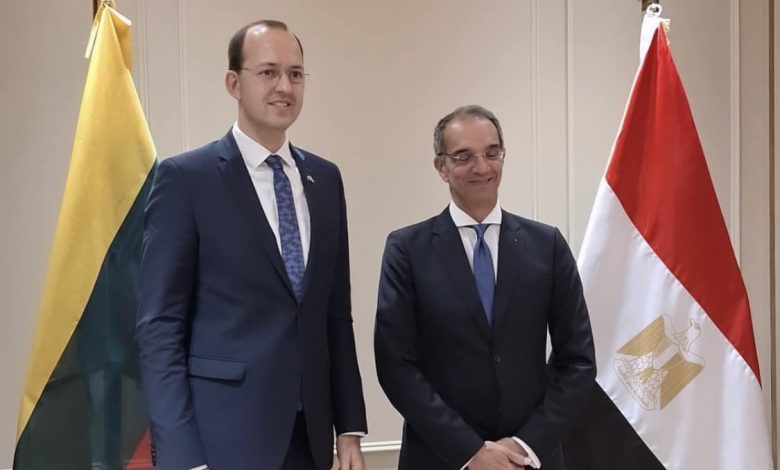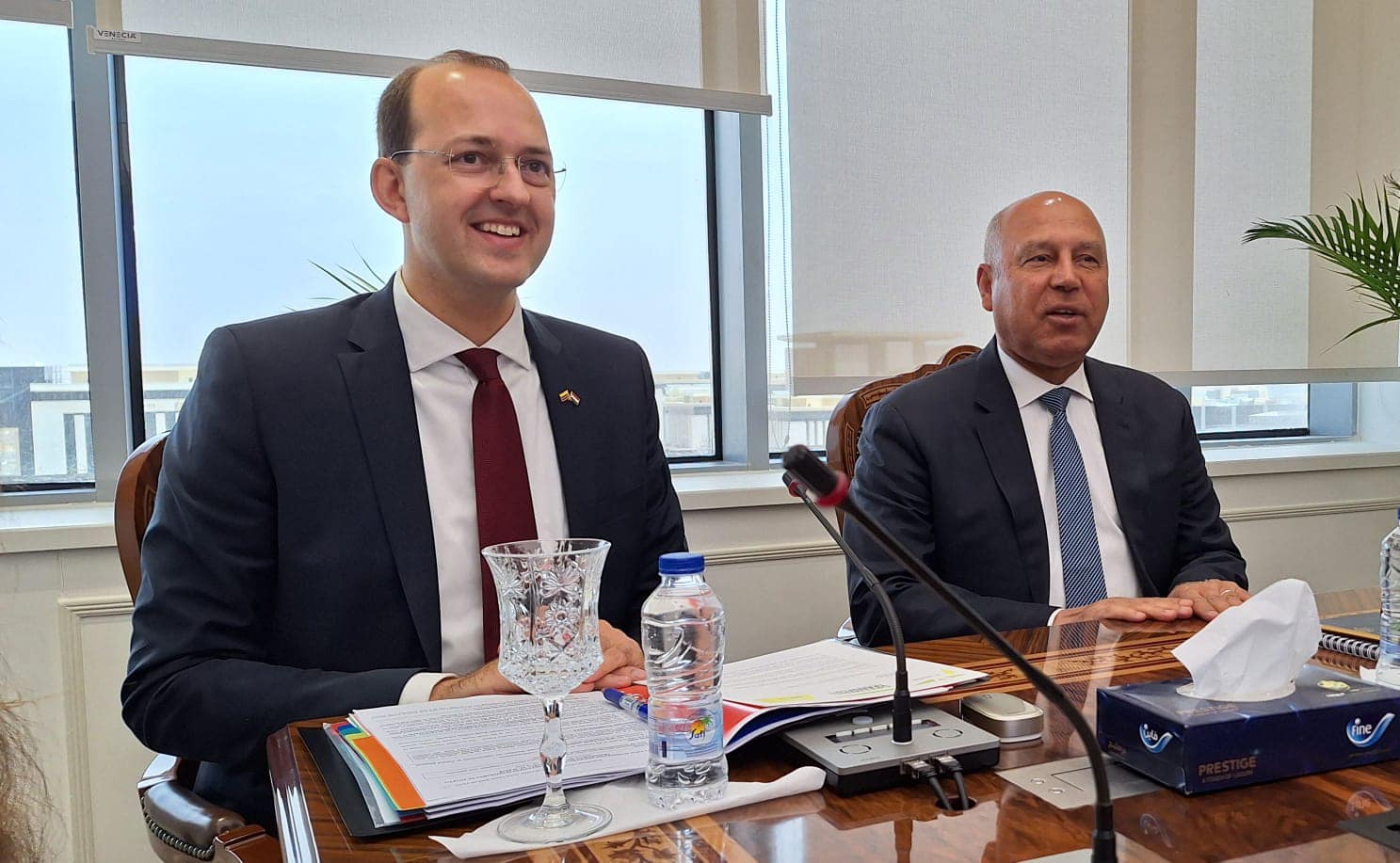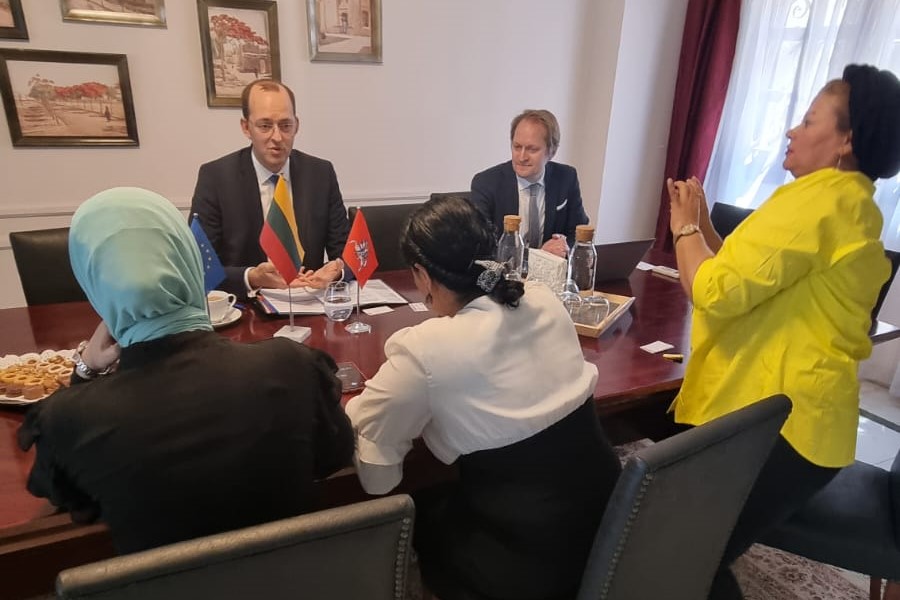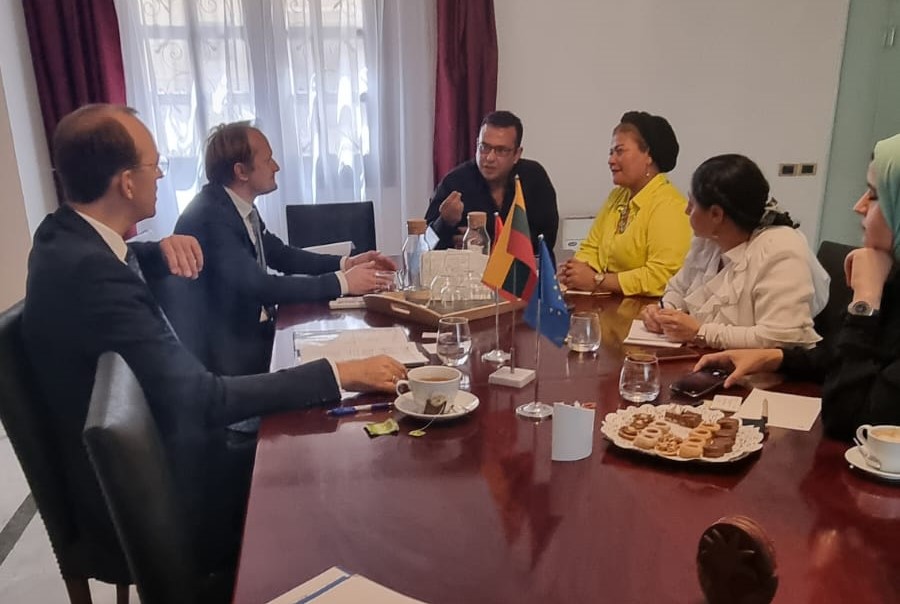
By: Mohamed Salah
Mr. Marius Skuodis, the Minister of Transport and Communications of the Republic of Lithuania, along with his accompanying delegation, has embarked on a business mission to Cairo to explore avenues for collaboration in trade and investment between the two countries in relevant sectors.
The visit itinerary was marked by a flurry of extensive meetings with senior Egyptian government officials and engagements with the Egyptian press and media. The mission commenced with a meeting with Dr. Amr Talaat, the Egyptian Minister of Communications and Information Technology, where discussions centered around enhancing cooperation between Egypt and Lithuania in the fields of communications and information technology, particularly concerning digital transformation, postal services, outsourcing, cybersecurity, and artificial intelligence. Ambassador Artūras Gailiūnas, Lithuania’s Ambassador to Egypt, was also present during the meeting.
The meeting also involved a review of the developments witnessed in the Egyptian telecommunications and information technology sector, the efforts of the Ministry of Communications and Information Technology to create an investment-friendly environment, and the expansion of the trained workforce in the field. Additionally, discussions highlighted prominent projects underway to develop digital infrastructure across the nation, as well as the advancements in the Egyptian postal service and the array of services it provides through its branches nationwide.
Dr. Amr Talaat emphasized Lithuania’s advanced status in digital transformation and information infrastructure, which has led to an increased demand for projects beyond the capacity of Lithuanian companies in providing human resources. This presents opportunities for collaboration between Lithuanian companies and the Egyptian telecommunications and information technology sector, particularly in outsourcing. Dr. Talaat encouraged Lithuanian companies to establish outsourcing centers in Egypt to employ Egyptian youth in various telecommunications and information technology specialties, aiming to enhance the required skills for the Lithuanian job market in these fields.
In response, Mr. Marius Skuodis, the Lithuanian Minister of Transport and Communications, praised the significant progress and achievements witnessed in Egypt, particularly highlighting the promising telecommunications and information technology sector as one of the prospective sectors. He affirmed the Lithuanian government’s support for companies to expand their operations within and outside Lithuania, as well as to establish partnerships with counterparts in other countries. He also emphasized Lithuania’s focus on developing its digital infrastructure, being the leading country in Europe in providing fifth-generation services, with 80% of Lithuania covered by 5G networks.
Moreover, Mr. Marius Skuodis met with Eng. Kamel El-Wazir, the Egyptian Minister of Transport, during which they discussed the possibility of deepening relations in maritime transport and logistics services. Additionally, the Lithuanian Minister extended an invitation to the Egyptian Minister of Transport to join the International Transport Forum’s 2024 Summit, where Lithuania holds the Presidency for the years 2023-2024.

Furthermore, the Embassy of the Republic of Lithuania in Cairo organized a press conference attended by Ambassador Artūras Gailiūnas, where Mr. Skuodis highlighted the investment and business opportunities in Lithuania. In an extensive meeting, Mr. Skuodis provided comprehensive insights into the investment promotion agencies in Lithuania and the extent of convergence and harmony between the Lithuanian and Egyptian people, evident in the preference of Lithuanian tourists for visiting coastal cities on the Red Sea coast.

During the discussion, Mr. Marius Skuodis underscored the promising future of Egypt-Lithuania relations, stating that both countries possess significant potential to enhance bilateral trade relations, especially in sectors such as technology, renewable energy, and traditional industries.

The convergence of strengths in these areas presents profitable opportunities for mutually beneficial cooperation and economic growth.
- Technology Sector: Egypt’s thriving technology sector, driven by its youth and experts in the field, complements Lithuania’s reputation as a technology hub in the Baltic region. Opportunities for collaboration exist in software development, information technology services, cybersecurity, and digital transformation initiatives. Leveraging Lithuania’s expertise in financial technology, e-commerce, and information and communications technology infrastructure can support Egypt’s efforts to accelerate its digital economy.
- Renewable Energy: Egypt’s ambitious goals in renewable energy align well with Lithuania’s advancements in clean energy technologies. Collaboration opportunities include solar and wind energy projects, energy storage solutions, and grid modernization initiatives. Lithuania’s experience in developing renewable energy and Egypt’s vast renewable resources create a conducive environment for joint projects and technology transfer.
- Traditional Industries: Egypt’s rich history in traditional industries such as textiles, agriculture, and manufacturing complements Lithuania’s expertise in related fields. Cooperative efforts can focus on modernizing traditional industries through technology adoption, improving processes, and diversifying markets.
Exports from Egypt to Lithuania:
- Textiles and Clothing: Egypt is renowned for its high-quality cotton production and textile manufacturing. Textile products, including clothing and fabrics, are important exports to Lithuania.
- Chemicals and Pharmaceuticals: Egypt exports various chemical products, including fertilizers, pesticides, and pharmaceuticals, to Lithuania. These products cater to the agricultural and industrial sectors in Lithuania.
- Food and Beverages: Egyptian food products such as fruits, vegetables, and processed foods are exported to Lithuania. Traditional Egyptian cuisine, spices, and beverages also find a market in Lithuania’s diverse culinary scene.
- Machinery and Equipment: Egypt exports machinery, equipment, and spare parts to Lithuania to support its industrial and manufacturing sectors. This includes agricultural machinery, construction equipment, and electrical appliances.
Imports from Lithuania to Egypt:
- Machinery and Technology: Lithuania is known for its advanced machinery and technological products, including electronics, communication equipment, and industrial machinery. Egypt imports machinery and technology to support infrastructure development and industrial modernization efforts.
- Chemicals and Petrochemicals: Lithuania exports various chemical and petrochemical products to Egypt, including polymers, plastics, and chemical compounds. These products are used in Egypt’s manufacturing, construction, and agricultural sectors.
- Renewable Energy Equipment: Leveraging Lithuania’s expertise in renewable energy technologies, Egypt imports renewable energy equipment such as solar panels, wind turbines, and energy storage systems. This supports Egypt’s efforts to diversify its energy sources and transition towards sustainable energy production.
- Transportation Equipment: Lithuania exports transportation equipment, including vehicles, aircraft parts, and railway equipment, to Egypt. These products contribute to the development of transportation infrastructure and the logistics sector in Egypt.
Overall, the trade relationship between Egypt and Lithuania is characterized by a diverse range of export and import commodities. Both countries possess complementary strengths and integrated resources, allowing for mutually beneficial trade partnerships and economic cooperation. As they continue to explore trade opportunities and enhance bilateral relations, bilateral trade between Egypt and Lithuania is expected to contribute to their economic growth and development. The potential for bilateral trade between Egypt and Lithuania in sectors such as technology, renewable energy, and traditional industries is promising. By leveraging their respective strengths and expertise, both countries can enhance innovation, create employment opportunities, and drive sustainable economic development. In exploring cooperation opportunities, companies and governmental entities need to facilitate partnerships, and knowledge exchange, and overcome any challenges to maximize the benefits of bilateral trade.
Through these collaborative efforts, Egypt and Lithuania can harness their respective strengths to unlock new opportunities for cooperation and economic development.



